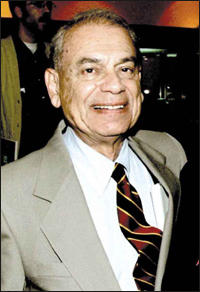From Teaching to Hisham Sharabi

I have not written anything about my teaching experience. I have taught Biology for undergraduates for a quarter, as part of my PhD requirements.It was very tiring and time-consuming, yet satisfying and so helpful and essential for my future in academia.
Among the things I wanted to know about and felt important to discover before I started teaching were the level of education the undergraduates have in America, and the grading system, as compared to that in Lebanon.
As an answer to the first question, I found that indeed, our level as undergraduates in Lebanon (and I believe it is the same in other under-developed coutries) is much higher than the level here in the States. This, though, should not fool anyone. It is true that an undergraduate from Lebanon has the answers to theoretical biology questions, more than an undergraduate student here could ever dream of answering, but my experience tells me that the gap which makes all the difference in the educational system is vast, and it is to the advantage of the American. I know saying this will offend most of my fellow Arab teachers who found their american students terribly dumb and lazy-minded. But what I'm specifically talking about is the ability of the american educational system to give a student space to analyze freely, instead of following blindly the words of the book. What we were responsible for as TAs was offering the guidelines of the scientific method. To train the students to use the basics of science. The "true" and "correct" answers were the least relevant. In fact, a "correct" answer did not gain you any points if it weren't reached through "Science". While a "wrong" answer could give you a total credit if it was attained methodically.
I have posted above the picture of Hisham Sharabi, whose two books I have been trying to read for months now (as most of you noticed). In his memoires (Embers and Ashes) and his "A Cultural Critique of the Arab Society" Sharabi, one of my favourate writers, and most knowledgeable (in my opinion) researchers, stresses quite a lot on this point. He addresses the issue as one of the major features of our "patriarchal" Arab society. Where individuals follow (just like in a herd) the image of the "perfect, know-it-all" father. The father being the political leader, school teacher, charismatic friend, or the head of the family.
Sharabi's analysis leads him to the belief that change towards a more aware, educated (in the real sense of the word), and civilized society of totally fulfilled individuals, can only be reached through breaking this curse of lazy and blind submissiveness to traditions and "convinient" concepts surrounding us. I would strongly recommend Sharabi's books, the ones I've read for him so far are a must read. I only hope the situation in Lebanon gives me time to read the rest of his books and less newspapers and political analysis.
I can say a lot more about Sharabi, his style, approach and philosophy, but this is not the point of this post, I am sure I will write more about his research later.



